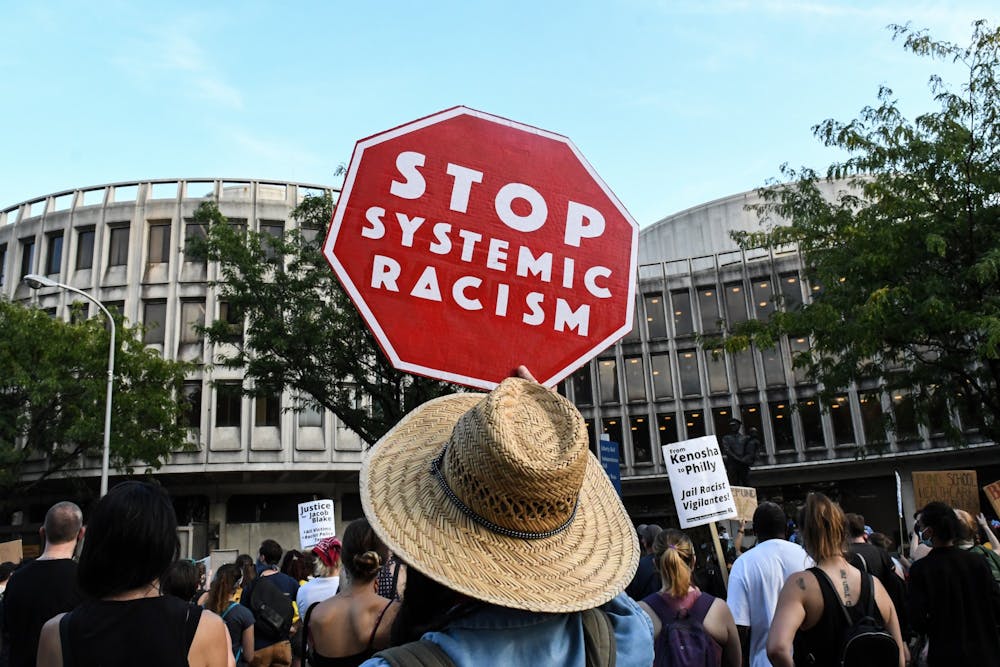Last week, while slicing a vibrant assortment of bell peppers, zucchini and mushrooms for a stir fry, I listened to Jenny S. Martinez, Dean of Stanford Law School, speak about the importance of the rule of law and the role the U.S. legal system has continually exercised in upholding systemic and structural racism. A few times during the conversation, I was taken aback by Dean Martinez’s candid words regarding racism in America. Her comments were refreshingly stimulating — finally, America’s reckoning with its full history has pervaded into some of the most elite spaces on the planet. This is what moving forward looks like.
However, by the time the garlic chili oil began to sizzle at the bottom of my wok, my mind began examining the different elements of the historical facades we are culturally fed on a constant basis. Before coming to college, most American students are not taught an accurate synopsis of America’s short and compelling history. Once at Penn, unless we take it upon ourselves, we can skip learning about the ways in which our society is strongly tainted by racism. This must change. All Penn students must be taught how white supremacy directly influences every element of our society.
In a world where our current President vows to withhold federal funding to schools that dare teach the accurate history of Black enslavement in America, we have roaring social, cultural, and academic problems. We have had these issues for centuries. Our education system is a core contributor towards racism; it needs to be an ally towards anti-racism. To enforce such an alliance, we all need to be taught a transparent account of history. Race simply cannot be ignored if we want noticeable progress. The Penn community cannot sit back and be color blind.
Penn history professor Brent Cebul recently published an article that illuminates the often forgotten role of the federal government in state violence against Black communities through urban renewal. Prior to reading, I had not realized how devastating these federal policies were to Black communities and families from 1949 to 1974. Most of our parents were born during that time period, so why is the destruction these policies caused not common knowledge? Because it’s not meant to be. Traditionally taught American history is oppressive, unambiguous and problematic. It must be unlearned.
A friend of mine, Amber Smith, LSW, graduated from Penn's School of Social Policy and Practice in 2019. Prior to graduating, she was required to take a course titled American Racism and Social Work Practice. The course description highlights exploring “racism in America as an historical and contemporary phenomenon. It emphasizes the development of evidence-based knowledge about institutional systems of racism, analytical skill in understanding the complexity of institutional racism and other forms of oppression more broadly defined, self- awareness, and the implications of racism.” Why is this a requirement for SP2 students but not for other Penn students? We all need to be socially aware. We all need to know about the influence of structural racism.
Amber now works at the Children’s Hospital of Philadelphia. When I asked her about her thoughts on a mandatory requirement that explores the historical impact of racism, she shared, “Practicing implicit bias while treating BIPOC is nothing less than dangerous, as it impacts your decisions and approach to their much-needed medical and mental health care. This unlearning is necessary to begin to break the structural racism perpetuated by the policies, procedures, and practices in environments providing medical and mental health care.”
Amber is correct. We must unlearn the notion that America is no longer dealing with racism.
Like America, Penn has a complex history with racism. Our medical school was co-founded by a professor accused of “snatching” Black bodies for experimental purposes. A medical school alumni member advanced the theory of polygenesis. Until recently, the Penn Museum held a collection of skulls that included the skulls of enslaved Blacks. Prior to his retirement in 1963, a Penn professor actively assisted the cause towards supporting segregation through his theories of racial science.
These few examples are grains of sand in comparison to the full picture of racism in the U.S.; however, they are relevant to understanding the ways in which our education system plays a gatekeeping position towards us creating an antiracist society. We need a requirement that provides every Penn student with baseline knowledge about the historical and contemporary impacts of racism. To gain a peaceful and prosperous society for all, we must disrupt the functionality of institutions that directly assist racism.
Ultimately, by not having a requirement that addresses racism, we are excusing white supremacy. Penn students are graduating, leaving Penn, and entering the workforce without the necessary tools to counteract the implicit bias and stereotypes that keep racism thriving. We are facilitating the systematic damaging of spaces. We are supporting violence against Black people. We are behind. California State University — which has over 481,000 students — Emory University, and the University of Pittsburgh have already implemented anti-racism requirements. It’s time for Penn to stop denying the need for an anti-racism requirement. The truth is, we need an anti-racism requirement today just as much as we needed one 200 years ago.

JESSICA GOODING is a College senior from Philadelphia, Pennsylvania studying History and English. Her email address is jgooding@sas.upenn.edu.









